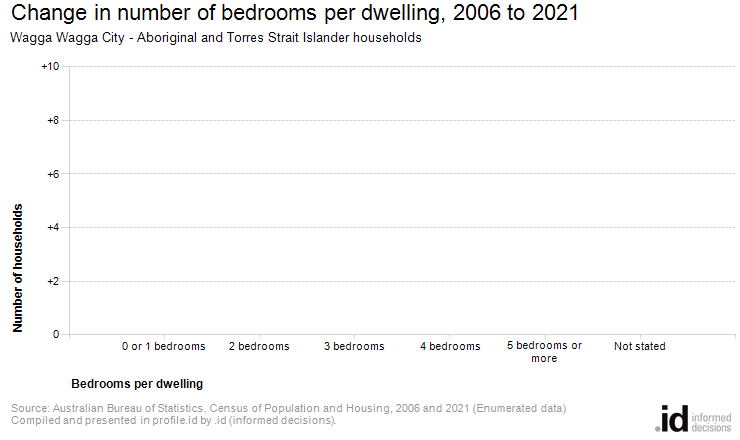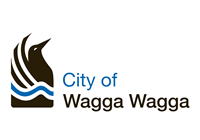Wagga Wagga City
Aboriginal and Torres Strait Islander profile - Number of bedrooms
Dwellings with 3 bedrooms are the most common for Aboriginal and Torres Strait Islander households in Wagga Wagga City.
The number of bedrooms in a dwelling is an indicator of the size of dwellings, and when combined with household size information, can be an indication of whether there is overcrowding in dwellings, and perhaps housing affordability and availability issues in the First Nations community in the area.
Households are counted as a First Nations household if they contain one or more Aboriginal or Torres Strait Islander usual residents on Census night. This dataset presents number of bedrooms in dwellings containing at least one Aboriginal or Torres Strait Islander usual resident. It is entirely possible and even probable in many cases that some bedrooms are occupied by non-indigenous household members or visitors.
Derived from the Census question:
'How many bedrooms are there in this dwelling?'
Occupied private dwellings containing family, group and lone person households
| Number of bedrooms per dwelling | ||||||||
|---|---|---|---|---|---|---|---|---|
| Aboriginal and Torres Strait Islander households - Wagga Wagga City | 2021 | 2006 | Change | |||||
| Number of bedrooms | Number | % | New South Wales - First Nations % | Number | % | New South Wales - First Nations % | 2006 to 2021 | |
| 0 or 1 bedrooms | -- | -- | 4.1 | -- | -- | 4.3 | -- | 21001 |
| 2 bedrooms | -- | -- | 14.4 | -- | -- | 16.7 | -- | 21003 |
| 3 bedrooms | -- | -- | 42.5 | -- | -- | 48.6 | -- | 21004 |
| 4 bedrooms | -- | -- | 28.4 | -- | -- | 22.0 | -- | 21005 |
| 5 bedrooms or more | -- | -- | 7.9 | -- | -- | 4.7 | -- | 21006 |
| Not stated | -- | -- | 2.7 | -- | -- | 3.8 | -- | 21007 |
| Total households | -- | -- | 100.0 | -- | -- | 100.0 | -- | 99999 |
Source: Australian Bureau of Statistics, Census of Population and Housing (opens a new window) 2006 and 2021. Compiled and presented by .id (opens a new window)(informed decisions).

Compiled and presented in profile.id by .id (informed decisions).

Compiled and presented in profile.id by .id (informed decisions).
Dominant groups
Analysis of the number of bedrooms in Aboriginal and Torres Strait Islander dwellings in Wagga Wagga City in 2021 compared to the number of bedrooms in Aboriginal and Torres Strait Islander population dwellings in New South Wales shows that there was a lower proportion of dwellings with 2 bedrooms or less, and a higher proportion of dwellings with 4 or more bedrooms.
Overall, 15.7% of households were in dwellings with 2 bedrooms or less, and 37.7% of 4 or more bedroom dwellings, compared with 18.4% and 36.4% for Aboriginal and Torres Strait Islander population households in New South Wales respectively.
The major differences between the number of bedrooms per dwelling for the Aboriginal and Torres Strait Islander population in Wagga Wagga City and the Aboriginal and Torres Strait Islander population in New South Wales were:
- A larger percentage of 4 bedrooms (30.7% compared to 28.4%)
- A larger percentage of 3 bedrooms (44.4% compared to 42.5%)
- A smaller percentage of 2 bedrooms (12.9% compared to 14.4%)
- A smaller percentage of 0 or 1 bedrooms (2.8% compared to 4.1%)
